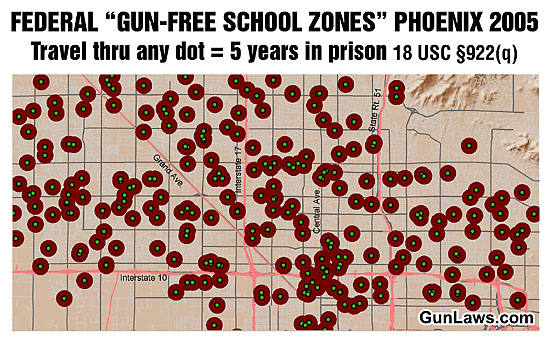|
Source 1
MOST PRIVATE GUN POSSESSION BANNED Gun-Free School Zones Impact Greater Than Expected New maps disclose unexpected result of 1,000-foot bans Federal law makes it a crime to possess a firearm off your property and within 1,000 feet of a school, with a few narrow exceptions. When all gun-free zones were recently plotted for schools in two major cities (Phoenix and Cleveland), using computer mapping, it became apparent that virtually all public travel with firearms is now a violation of law. The study was included as part of a ten-year review of all federal gun law by gunlaws.com, for the Tenth Anniversary edition of Gun Laws of America, the unabridged guide to federal gun law. Published by Phoenix-based Bloomfield Press, it has just been released. Without realizing it, and by an unexpected route, anti-gun-rights advocates have achieved their primary goal -- gun possession is effectively banned by federal law. A five-year federal prison sentence attaches to every crossing into a school zone, and the zones overlap virtually citywide. The public commits countless millions of gun violations by simply moving around. No effect on crime has been reported. Members of Congress and even the NRA are on record calling for strict enforcement of current federal gun laws. How that policy and the school zones measure can co-exist is not clear. Additional maps and the dataset are posted at gunlaws.com "This near-total gun ban is simply unenforceable, and was never intended to criminalize everyone who bears arms," said Alan Korwin, author of Gun Laws of America. "We would have to place half the public in prison to comply with this law. It shows the folly of such legislation, perhaps the most ineffectual feel-good gun law ever enacted, and it needs to be repealed," he said, adding that it must be humiliating to the bill's original sponsors. "Where would Justice Roberts stand on this issue, and what was Sen. Feinstein really asking?" Many politicians are quietly aware of the ban. The simple act of buying a gun and bringing it home, taking one to the range, going hunting, or carrying one for personal safety would subject most people to arrest and a permanent criminal record under this law, originally enacted by President Bush's father, President Bush, in 1990. The Gun-Free School Zones law was struck down in 1995 by the U.S. Supreme Court, in the now-famous Lopez case, referred to today by Sen. Feinstein, a staunch anti-gun-rights advocate. For the first time in decades the Court ruled that Congress had overstepped its powers to regulate states under the Commerce Clause. There were more than 121,000 local schools at the time. Congress responded by swiftly reenacting the entire law, under President Clinton in 1996, with a few small changes it believed bypassed the Court's concerns. No new case has been brought to test the new version, so it stands. |
